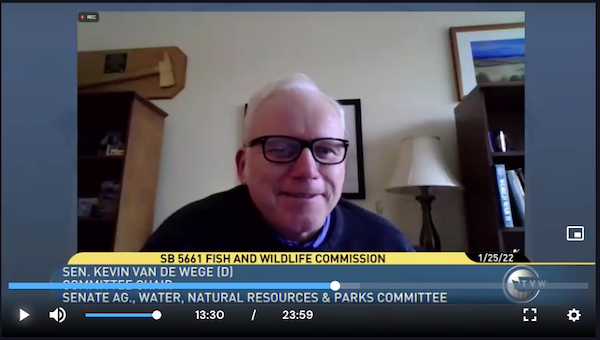
Senate Committee Hears WDFW Commission Bills
A state senator claimed credit for yesterday’s naming of new Washington Fish and Wildlife Commission members by the Governor’s Office, saying that three related bills his committee was set to hear this afternoon “did have some effect.”
“We’re making things happen here in the legislature,” said Sen. Kevin Van De Wege, a Sequim Democrat, with a bit of a chuckle at the beginning of a public hearing on he and fellow lawmakers’ SBs 5656, 5661 and 5721.

Just a bit over 24 hours beforehand, Governor Jay Inslee had appointed John Lehmkuhl, a retired US Forest Service research biologist; Timothy Ragen, the retired executive director of the U.S. Marine Mammal Commission; and Melanie Rowland, a retired National Marine Fisheries Service attorney who is the staff counsel for the Methow Valley Citizens Council, to the panel that sets WDFW policy.
In doing so, the governor filled an Eastern Washington commission seat that had been vacant for a whopping 389 days, a Westside position that had been occupied but without an official reappointment for an even longer 451 days and a third that opened up in mid-December 2021 with the resignation of an at-large member, respectively.
Application forms that Lehmkuhl, Ragen and Rowland filled out to join the board were posted this morning on Hunting Washington, sparking further discussion about them and speculation about how things might play out on the commission in the future.
Inslee’s press office did not respond to a request for comment on Van De Wege’s statement.
The first two of today’s bills before his Agriculture, Water, Natural Resources & Parks Committee aim to modify how commissioners can be appointed and removed, strengthening the Senate’s hand in the joint process with the governor, while the third would stuff WDFW and its citizen panel under the elected Commissioner of Public Lands, a position currently held by Hilary Franz.
SB 5656 requires the governor to put forth a new appointment to the commission if the Senate doesn’t confirm the previous appointment within 12 months, essentially establishing a pull-by date.
Cosponsor Sen. Jesse Salomon, a Shoreline Democrat, argued that the structure of the commission was “fairly unique” in the power granted to an unelected body to shape hunting, fishing and resource conservation policy for WDFW, as well “hire and fire” its director, and said that after members are appointed, they’re beyond the control of the governor’s influence, “and that calls for more oversight.”

He said that even as commission statutes give the Senate “advise and consent” power over appointments – the natural resources committee can hold a meet-and-greet with the individual and then send a do- or don’t-confirm message to the full body for an up-or-down vote – it was “unlikely” lawmakers would boot somebody if the powers that be are all in the same political party, which in Washington currently is the Democratic Party.
So, given the politics, Salomon said if senators “could decline to renew” a commission appointee, it would provide “a lot more input for the democratically elected Senate into this policy-making body and structure.”
SB 5661 creates a new rule that commissioners can’t serve if they haven’t been officially reappointed – which was the case with former Chair Larry Carpenter since Halloween 2020 – and hands Senate and House leaders the power to appoint a new member if the governor doesn’t fill a vacancy within 60 days.
Sen. Jim Honeyford, a lower Yakima Valley Republican, cosponsored that bill and said his goal had been to get a third Eastern Washington representative on the commission as soon as possible.
November’s controversial spring bear vote – as well as all of 2021’s discussions, debates and decisions – featured a maximum of only two members from the 509, where most of the limited-entry bruin permits are available.
But with yesterday’s appointments, the region now has the required three, with Lehmkuhl of the Wenatchee Valley joining Kim Thorburn of Spokane and Molly Linville of Palisades.
Then there is Van De Wege and Salomon’s SB 5721, which in putting WDFW under the Commissioner of Public Lands, also hands the lands chief the power to name the agency director and strips the Fish and Wildlife Commission of its authority and turns it into an advisory panel – a potentially politically charged gambit, given how sharply it contrasts with the results of a statewide vote two and a half decades ago. It also folds State Parks into the CPL’s brief.
During public comment, Nello Picinich of the Coastal Conservation Association said his organization recognized shortcomings in the bills, but the status quo wasn’t working and had signed in in favor of them “to show support for a much-needed discussion on the importance of addressing the lack of accountability in our state’s management of fish and wildlife.”
Lobbyist Carl Burke, speaking for the Northwest Marine Trade Association and Northwest Sportfishing Industry Association, said the industry supported the three bills, as well as a fourth that sets up a task force to study WDFW’s governances and the agency and the commission’s statutory mandate. That bill, HB 2027, is in the House and has a hearing before the Rural Development, Agriculture & Natural Resources Committee Wednesday morning.
“We are open to all legislative solutions that better serve to protect our valuable natural resources,” Burke said.
NSIA was a backer of 1995’s Referendum 45, which attempted to remove politics from critter management by moving the power to appoint WDFW’s director from the governor to the commission, and passed on a statewide 62 percent to 38 percent vote, with majority approval in all 39 Washington counties, but it has since reassessed that position.
“It’s clear by the unending and constant turmoil the current commission creates that things are not functioning well at all,” said Liz Hamilton, NSIA’s current director, in emailed comments to this reporter this afternoon. “We are open to anything that improves functionality within the commission, and between the Commission, WDFW and the stakeholders. We are gratified that members of the Senate and House recognize the problems and are offering potential solutions.”
CCA and NSIA have been most deeply involved in efforts to move nontribal commercial gillnetting off the mainstem Lower Columbia and increase recreational angler salmon shares, a process that has hit snags in recent years. One of their allies in the Senate has been Van De Wege, who has tried legislatively to ban the gear and, barring that, restrict it to just a specific area and single salmon run in the Columbia, but was thwarted by an Inslee veto, and now is proposing relegalizing fish wheels and pound nets.
NMTA is unhappy with increasing state restrictions to Chinook fishing in Puget Sound and has supported the Fish Northwest lawsuit.
However, others argue that Fish and Wildlife Commission governance isn’t the issue; it’s the third-term governor’s appointments that are causing problems.
There will always be differences when it comes to how best to conserve the state’s fish and wildlife and maximize its angling and hunting opportunities – WDFW’s twin mandates – but things have grown sharper in this longtime commission reporter’s reckoning since Inslee’s joint appointment of Fred Koontz and Lorna Smith very early last year. Certainly Columbia issues in past years have been very difficult, but these have been a tough few months for the citizen panel, given its unsettling September draft conservation policy, tie November vote on the spring black bear vote, controversial December statements over the Blue Mountains elk herd and last Friday’s 4-3 acceptance of hunters’ petition to restart rulemaking for a potential 2022 bruin season.
Fishing advocate Ron Garner of Puget Sound Anglers has been warning about the commission-targeting bills and others filed in the legislature he says together amount to a “power grab to takeover WDFW.”
“Basically, they got their thumb on you and if they don’t like you, you’re fired,” Garner said of senators and SB 5656 during a segment on last Saturday morning’s The Outdoor Line on ESPN 710.
Garner’s also been worried about part of yet another bill that could impact increased state hatchery production by inserting a science advisory panel into the equation, which he says would just duplicate WDFW and tribal expertise. In the past, Van De Wege has supported convening such a board, but it too was vetoed by Inslee.
Today’s committee meeting was supposed to also include a hearing on SB 5721, the WDFW-State Parks-Commissioner of Public Lands consolidation bill, but Van De Wege said he was low on energy and that it would be saved “for another time.”
Apparently the bill had elicited a fair amount of public opposition – but largely to the State Parks element, which was not the actual primary target, if all these other WDFW/commission bills are any indication.
It’s also a pretty ambitious lift for a short 60-day session, and besides, the point was probably made.
The only on-the-record comment against the bills was filed by Samantha Bruegger of Washington Wildlife First, who said she understood the intent with SB 5661, but said she “believed the governor has seen the problems caused by this sort of delay in the appointment process and we hope and we believe it won’t be repeated.”
In the end the delay set the stage for November’s spring bear tie.
As it stands Van De Wege suggested Salomon and Honeyford work together to meld elements of SBs 5656 and 5661 into a new bill ahead of a February 3 committee executive session. That date is also the cutoff to get bills out of their committee of origin and read into the record on the floor of the originating chamber.

